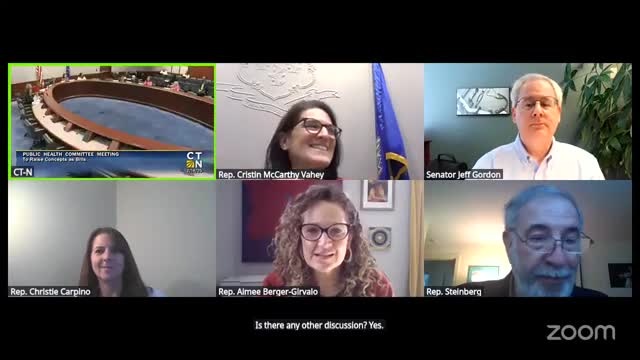Public Health Committee raises five concept bills including veterans’ neuromodulation funding and CON changes
Get AI-powered insights, summaries, and transcripts
Subscribe
Summary
The Connecticut General Assembly Public Health Committee on Feb. 14 voted to raise five concept bills for public hearing, including funding for neuromodulation treatments for veterans at the University of Connecticut and Office of Health Strategy proposals to revise the health care cabinet and the Certificate of Need program.
The Connecticut General Assembly Public Health Committee on Feb. 14 voted to raise five concept proposals for public hearing, including a plan to fund neuromodulation treatments for veterans at the University of Connecticut and Office of Health Strategy (OHS) proposals to revise the health care cabinet and the Certificate of Need (CON) program.
The committee’s vote will allow language for each concept to go to a formal public hearing; the chairs said roll-call records from the meeting will remain open until 3 p.m. for members to finalize their votes. The five concepts placed for hearing were: funding for neuromodulation treatments for veterans at the University of Connecticut; a proposal on medical device representatives; licensure for international board-certified lactation consultants; OHS recommendations to revise the health care cabinet; and OHS recommendations regarding the CON program.
Representative Jenga, who introduced the neuromodulation concept, said the proposal would support a center of excellence at the University of Connecticut, with follow-up care at Hartford HealthCare/Hartford Hospital. “Over 60 percent of our veterans have chronic pain and they live with it today,” Representative Jenga said, adding that the treatment combines brain and spinal stimulation and that clinicians at a symposium reported successful outcomes for more than 70 percent of patients who have received the therapy. He also cited veteran suicide statistics during his remarks and urged support for the concept so Connecticut could “be a leader” in offering the treatment.
Senator Gordon expressed support for the veterans’ neuromodulation concept, saying he had seen beneficiaries and describing the treatments as having meaningful effects on quality of life.
On the proposal addressing medical device representatives, Senator Summers said she opposed the concept, describing her own past experience as a device representative and arguing hospitals already credential representatives through internal credentialing processes. Senator Amore said the state lacks a uniform mechanism across hospitals and framed the concept as a chance to reduce patient infection risk by clarifying credentialing and operating-room practices.
The committee approved raising the concept to require licensure for international board-certified lactation consultants; Representative Martinez moved that concept. Members who spoke in favor cited reasons for licensure; Representative Reddington Hughes registered a question but did not ultimately block the concept from being raised.
Committee members also discussed two OHS proposals: one to revise the health care cabinet and another to reform portions of the CON program. Senator Anwar described the CON-related concept as intended to prevent abrupt service terminations in communities and to add expedited review pathways for certain projects; he said the proposals would allow OHS to use preliminary Cost and Market Impact Review (CMIR) reports for applications. Representative Zepkus and Senator Gordon said they needed more detail before supporting the CON proposal and registered “no” votes on the concept, while Senator Anwar and other supporters said the measure was intended to be a modest, streamlining step.
Chair comments, procedural notes and next steps: committee officers said the votes recorded at the meeting would remain open until 3 p.m. so members could confirm or change their roll-call votes. The committee announced its next meeting for Wednesday, Feb. 19 at 11:30 a.m., and a public hearing scheduled for Friday, Feb. 21 at 1:30 p.m. The committee also said it will not take further action on the item addressing tobacco and electronic nicotine delivery systems at this committee, noting that other committees will consider that topic.
Votes at a glance
1) An act concerning funding for neuromodulation treatments for veterans at the University of Connecticut — Motion to raise concept moved by Representative Jenga, seconded by Senator Anwar. Outcome: concept raised for public hearing by roll-call; individual roll-call votes are recorded in the transcript and votes are being held open until 3 p.m.
2) An act concerning medical device representatives — Motion moved by Senator Amore (moved earlier in the meeting by Senator Amore), seconded by Representative Tavares DeGraw. Outcome: concept raised for public hearing by roll-call; notable opposition from Senator Summers who cited industry credentialing practices.
3) An act requiring licensure of international board-certified lactation consultants — Motion moved by Representative Martinez, seconded by Senator Amor. Outcome: concept raised for public hearing by roll-call.
4) An act concerning OHS recommendations regarding revisions to the health care cabinet — Motion moved by Senator Anwar, seconded by Representative Morinbello. Outcome: concept raised for public hearing by roll-call.
5) An act concerning OHS recommendations regarding the Certificate of Need program — Motion moved by Senator Anwar, seconded by Representative Belton. Outcome: concept raised for public hearing by roll-call; several members (including Representative Zepkus and Senator Gordon) voiced that they wanted more detail and recorded their opposition during the roll call.
Why it matters: the committee is in the “raise concept” stage, which authorizes public hearings that allow stakeholders to submit testimony and recommend changes before any bill text is finalized. The CON proposals and the neuromodulation funding concept drew the most policy-focused discussion: members debated state authority over service closures, expedited review pathways, and standardizing credentialing in hospital settings.
Next steps: the committee will publish bill language for the raised concepts, hold public hearings and accept testimony before any formal bill language advances to subsequent committee action.
